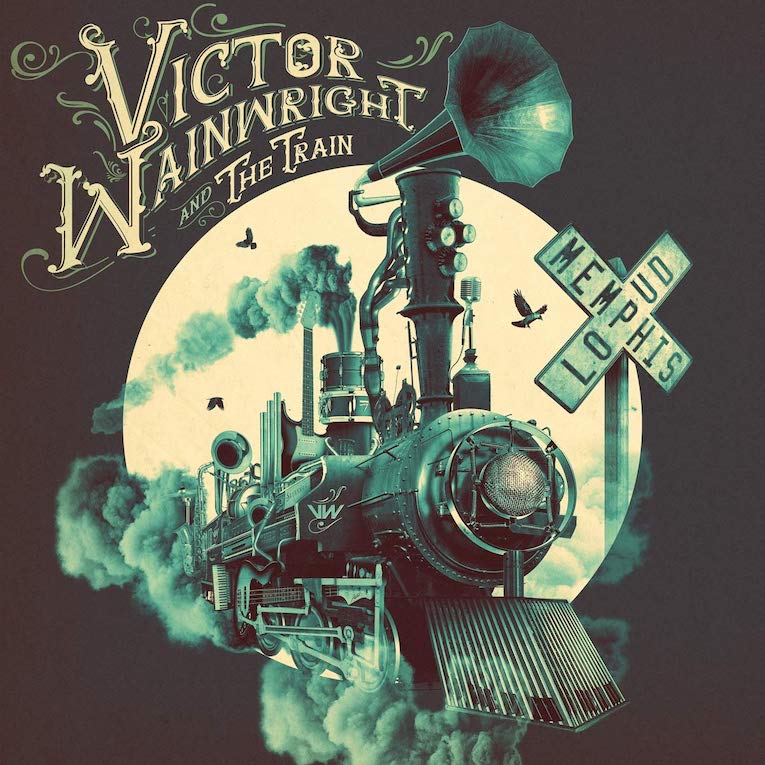
Victor Wainwright
By Chris Wheatley
Call it jump-blues, boogie-woogie, honky-tonk or plain old rock ‘n roll, the music which Grammy nominee, Savannah-born pianist Victor Wainwright records and so clearly adores, practically crackles with electricity. It’s a force summoned from the deep roots of the earth and channelled through the spirit and into his fingers, powered by American history and informed by decades of roots music.
Set to release May 22, 2020 on Ruf Records, Memphis Loud is Wainwright’s sixth album since emerging onto the scene in 2005. In the intervening years he’s garnered more blues awards than can be mentioned, plus the small matter of a Grammy nomination and numerous Pinetop Perkins Piano Player of the Year Awards. What we have here are twelve original tracks, all written or co-written and produced by Wainwright himself, backed by the Train – Wainwright’s hand-picked musicians. Instrumentation includes not only drums (Billy Dean), bass (Terrence Grayson) and guitar (Pat Harrington and guest Monster Mike Welch), but the jump-blues staples of sax (Mark Earley) and trumpet (Doug Woolverton).
Victor Wainwright, it must be said, is an incredible pianist. His voice is as strong and as emotional as any of the great blues-shouters of the past. While certainly capable of conjuring fire and propulsion with the keyboard, Wainwright possesses a broad palette of styles. Witness opener “Mississippi,” which kicks off with some beautiful jazz-inflected runs, reminiscent of Herbie-Hancock, before exploding into full-on barrel-house rock. He is also able and willing to lay back and have fun. On “My Dog Riley,” we get some lovely, shuffling runs and classic vamps. “America,” showcases Wainwright’s often overlooked ballad playing. Similar to Jerry Lee Lewis, Wainwright can approach any style with equal dexterity and invention.
Memphis Loud presents a sumptuous buffet of songs, bringing to mind every decade of the blues and beyond. We have down ‘n dirty 40s, uplifting, joyous 50s, big-band brass and slow, soulful 70s. You don’t have to dig deep to also hear pop, funk and even elements of progressive rock. In lesser hands, it could have resulted in something of a mess. Here, though, Wainwright succeeds in pulling it all together. He is generous enough to give ample space to guitar and other instruments. The songwriting is strong, if straight-forward, though it’s the instrumental passages which really catch the ear. Such criticism seems harsh in the face of such gorgeous and stirring vocals. It is simply that Wainwright and all the musicians on this record are such masterful players that it is a delight to hear them stretch and kick out.
A word on the cover-art, which features an engaging rendering of an old-fashioned locomotive, on the top of which has been fixed an enormous loud-speaker. The locomotive steams forth before a full moon. It’s a concise and accurate representation of the album’s contents. Trains have always provided a powerful motif for roots music. In the early days of the iron beasts which criss-cross the nation, they provided a vital conduit for the cross-pollination of music and musical ideas. In the era of the Great Depression, itinerant players would often stowaway on the metal engines (a dangerous affair) in search of greener pastures. This idea of journeying, of learning, is clearly central to Victor Wainwright’s music. He is a musician who looks forward just as much as he looks back, ever seeking new sounds and new means of expression.
With Memphis Loud, Victor Wainwright certainly brings down the roof, yet he also brings us delicacy and nuance. Those expecting non-stop action may be disappointed. Approach with an open mind and open ears, and disappointment is the last thing you will experience.
Victor Wainwright & The Train Online

Leave A Comment